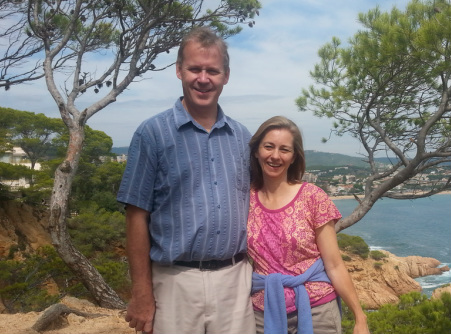 We left on our journey on the 22nd of August, and I (Lisa) have decided I will try to post a different sort of reflection on or near the 22nd of each month. In our blog we generally reflect on our responses to countries and to the ways we see God at work in churches or para-church movements in those countries. In these monthly posts, I will reflect more on how we are doing. This month I’ve decided to break that down into three threes, with a bonus set of three for those who endure to the end. The short answer to how we are doing is that in general we are doing very well. We miss our families, friends, and dog, but we are happy, we are learning, and we feel that our gifts are being used well to serve others. For a longer answer, read on. Three Truths that are Settling More Deeply into Our Hearts A theme in Scripture is that God often sends people on journeys so that He can impress some truths upon them at a depth-level that for some reason is less possible when we’re settled in our homes. I feel this happening for me. The truths below are not new for me or for any reader; they are just working their way into my soul more deeply, and for that I’m grateful.
Three Practices That Are Helping Us to Thrive:
Three Resources We Are Enjoying:
Three Most Memorable T-Shirt Messages So Far:
2 Comments
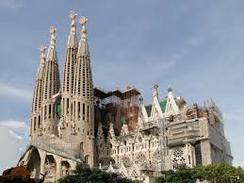 It took three visits to Barcelona before we actually went inside La Sagrada Familia cathedral. When Lisa and I visited Barcelona during the summer after we had celebrated our first anniversary of marriage, La Sagrada Familia was not open for visitors. We saw it from the outside, and while it was interesting, it didn't look very much like a cathedral and Lisa didn't really like the architecture at all. (It looked like a sand drip castle on a grand scale.) Then, last year, when we visited Barcelona with our kids, we were put off by the long lines to buy (not cheap) tickets when for most cathedrals in Europe it is possible simply to walk in. But this year we were with a group of IVCF students at the Study Abroad Launch (see previous post) and we had planned to go together as a group. So we finally went on a tour and were able to view the whole thing, inside and outside, including the basement gallery, which was a highlight for me. La Sagrada Familia was commissioned nearly 150 years ago and it's central vision was shaped by Antonio Gaudi, who began work on it in the 1880s and died as a result of a tram accident in 1926. Since then, work has proceeded according to Gaudi's models and designs and vision, and though it is not completed the cathedral has been in use for the last few years. A few things struck me during this visit:
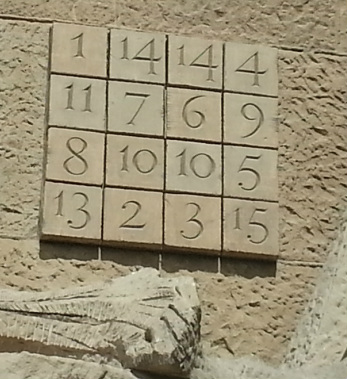
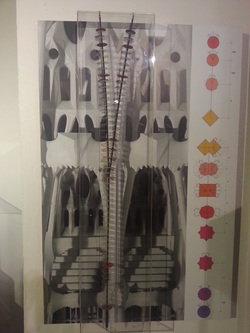 (Above) The description (including in English) of how the Magic Square's cells add up to 33 in multiple ways, including all the rows, columns, and diagonals, as well as a number of other symmetrical pieces of the Magic Square. (Left) This is a study of how the columns, to support the arches, change their cross section from circular to star-shaped, to rectangular to splitting into two square-shaped supports, to back to circular again. Every cross section has multiple axes of symmetry, and mathematical elegance.
Thirty something years later, and now Lisa and I have been in Barcelona to meet with IVCF students from the US who are studying abroad for a year. This weekend, we met with two other staff and a small group of students who are studying in Madrid, Barcelona, Paris and Dublin to study scripture and to help them to think of themselves not just as international students, but as missionaries to international students and other students in their universities this term or year.
We looked at several stories in scripture of displaced people, from Daniel who was taken in exile from Jerusalem to Babylon to be an "international student" there, to Philip who met the Ethiopian eunuch returning from Jerusalem. We talked about how being displaced and on a journey creates opportunities and opens our eyes to new experiences. Daniel and his friends had to find new ways to be faithful when the temple worship and Jewish rituals were stripped from them. The wealthy and powerful Ethiopian eunuch didn't travel in the same circles as Philip when they both might have been in Jerusalem, but on the desert road he finds himself eager to learn from Philip, and came to believe in the messiah of whom he was reading in Isaiah 53. Reading these stories in the context of being in Europe for a semester or a year shed new light and presented new challenges to the students. Students come to Europe for many reasons, but becoming missionaries to the people they will meet there isn't typically on the top of the list, any more than it would have been for me in my college years. But this weekend we invited these students to join their Spanish, French and Irish brothers and sisters by getting involved in the local IFES chapters, and to see their study abroad colleagues and other fellow students as people in whom God is already at work as he uses these displaced missionaries to bring the good news to them. I remember a time when I might have thought it unnecessary to send missionaries to Western Europe, the heart of "Christendom." But certainly that time is no longer, and while God is doing many things here among his people, the IFES staff we have met here are eager to connect with American students who will join them in outreach to their fellow countrymen and women. If you want to learn more about InterVarsity Study Abroad outreach, or know someone for whom this might be helpful, I encourage you to watch and/or pass along this link: http://vimeo.com/66860475 Next weekend, Lisa and I will be in London, bringing the same retreat to another group of IVCF students studying in the UK and Ireland. As an added sweet bonus, our son Mark, who came to London as an international student 3 years ago, will join us for the weekend, which will be his first InterVarsity event since he started college. 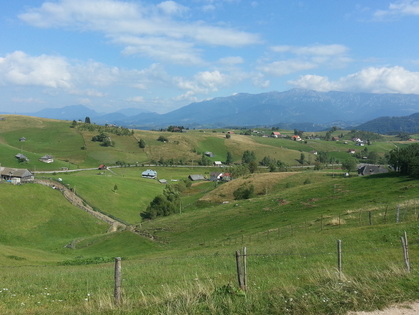 Being in Romania has been jarring in some ways. It would be less so if we could stay on the surface of it. For example, the weather has been a pleasant and lovely contrast to our last couple of weeks, where we hit a steak of cold and rain. Romanians are eager to assure us that it gets quite cold in winter, but it is currently basking in a delightful late-summer sunny stretch. The scenery has also been more beautiful than we could have imagined. It can seem almost idyllic as we drive through rolling green hills, passing horse-drawn carts on our way to a weekend retreat with a local church from the city of Pitesti. But then we start to hear the stories. Stories of almost unimaginable suffering under Communism, and of its ongoing legacy for the nation and the church. While many of the rulers who clawed their way to power in the Soviet-era were cruel and self-serving, Nicolae Ceausescu almost certainly takes the prize. Ruling from 1967 until his execution in 1989, he impoverished his nation with terribly misguided policies. Incredibly, he was inspired by a visit to North Korea, where he took a liking to the idea of a nation worshipping its leader, and implemented policies to further that goal. He had the grandiose vision of increasing the nation’s population by millions in a short span of years, and so declared any childless couple to be traitors of the state. He declared the fetus ‘the property of the society,’ and encouraged women to be pregnant as often as possible. Predictably, given food shortages and a lack of prenatal care, the infant mortality rate soared to 83 per 1000. (Just for comparison if you, like me, haven’t thought about infant mortality rates recently: developed nations like German, Austria and Australia hover around 4 per 1000 today; the very poorest nations in the world, like Mali, hit numbers in the low 80’s. http://data.worldbank.org/indicator/SP.DYN.IMRT.IN) Children born under a certain weight were declared miscarriages and denied treatment. As one Romanian doctor put it, “While banning abortion, he did nothing to promote life.” All agree that his policies were dreadful. But sadly, the pendulum has swung tragically far towards a culture of abortion. Abortion rates are the highest in the EU at 480 per 1000 births; some estimate that Romanian women in their twenties will have 10-20 abortions during that decade of their lives. Married couples are reproducing at troublingly low rates. Alex and Nati, the pastor couple who have hosted us this past week, had a striking insight. They dream of having an impact on their nation in this area, and as part of preparing for that, they have read numerous American debates online on the topic. They find them of little use because, they say, “In the US it seems to be all about the age at which a fetus is viable. Here no one quibbles about whether it is a life. They simply do not value life.” This last phrase has landed heavily in my heart. I too am passionately pro-life, though I am sensitive to the ways that Christians (and certain Congressmen who may or may not be Christian) in the US have entered the fray with rhetoric and protest methods that have been hurtful to women and not all constructive. I don’t want to be one ‘those’ pro-lifers. I want to be truly pro-life: life for women facing very difficult choices, life for men who face losses as well in those moments, and life for children, born and unborn. And I know that the issue is incredibly complex. 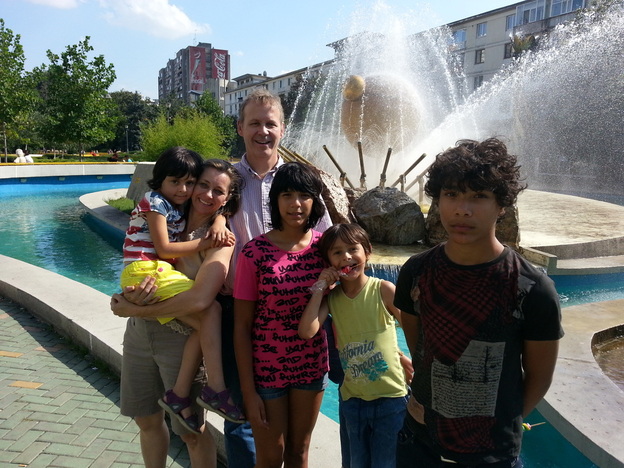 Alex and Nati's four adopted children: Krina, Alina, David and Kristi. Perhaps for our benefit, Krina is wearing an American flag shirt, and David's shirt reads "California Dream". Alex and Nati's four adopted children: Krina, Alina, David and Kristi. Perhaps for our benefit, Krina is wearing an American flag shirt, and David's shirt reads "California Dream". This is why I’m so inspired by the simple, sacrificial step I see Christians taking, everywhere we go in Eastern Europe. As we’ve tried to synthesize a few patterns from our brief visits to four nations, one profound trend we’re seeing is that Christians are treasuring children, with big, open hearts. Young couples are having children and caring for them well—in itself a prophetic act in a culture where children are seen as impediments to women getting the rights to careers that were denied them in previous generations. Many are taking in foster children, like the single mom we met who has six foster children and is working to adopt them all. IFES staff and the young generation of pastors emerging in Belarus, Latvia, and here in Romania are not just adopting, but adopting later in life after their biological children are well into their teens. They are adopting the toughest children to place, and they are adopting greater numbers of children than they had initially set out to adopt. Alex and Nati have adopted four children from the Roma culture, an ethnic group which is looked down upon here, sometimes cruelly. These four have endeared themselves to us hugely in our time in their home. They have little English, but we can say “Wow!” when they show us their artwork and new school backpacks, I can show them how to use a drawing app on my phone during a long car ride, and our hearts can break as we hear a little from their parents about the pasts they lived before coming here. I had not expected children to be such a big part of our adventure this year, but I am so delighted that it is. As God continues to enlarge our own hearts to welcome children, we hope God will show us how to be truly pro-life in our local context throughout our lives.  In Romania, we stopped in Bran, the home of the "Dracula Castle" where Vlad the Impaler was at one time locked up. As our Romanian host said, "We think of Vlad as a good king--he was kind and compassionate, but he also impaled people who were his enemies." Alex seemed to feel Vlad has gotten an undeserved reputation. But the highlight of our visit in Bran was tasting Kurtosh, after watching the vendors make it before our eyes. They started with dough rolled out like pizza dough, and this was wrapped on what looked kind of like a baseball bat. (Like they were taping up the wrong end of the baseball bat, but with dough.) This dough-on-a-bat they painted with either oil, watery butter, or just water and then sprinkled generously with sugar.  They then put the bat over a charcoal fire (along with five other similiarly prepared bats) and the bat rolled in rotisserie fashion for just a few minutes, while the white dough turned golden brown before our eyes. After removal from the fire, the dough was sprinkled with nuts, cocoa, coconut flakes, or cinnamon and then removed from the bat and served, still piping warm and soft, in a long bag. But it didn't stay in the bag very long because we ate it up quickly. I found pictures of Kurtosh called "Chimney Cakes" so perhaps you have heard of them before. But I had never heard of or seen them before. They were doughy like donuts, quick like funnel cakes, but not fried in oil and had a very light sweet taste. Our friend Alex asked if we thought a business selling Kurtosh could work in the US. I assured him that there would be a ready market. We are here in Romania, at the end of our week here, after teaching at a retreat for a recently planted church, Petra, on the promises of God in Romans 8 and their implications for our lives. The teaching was well received, and we had a number of good conversations with the church members, many of whom were involved in the IFES group in Romania before they graduated from University (and a few of them were still involved in IFES as they were still students). We were impressed by the depth and vitality of this young and growing church community, and enjoyed our time with them. 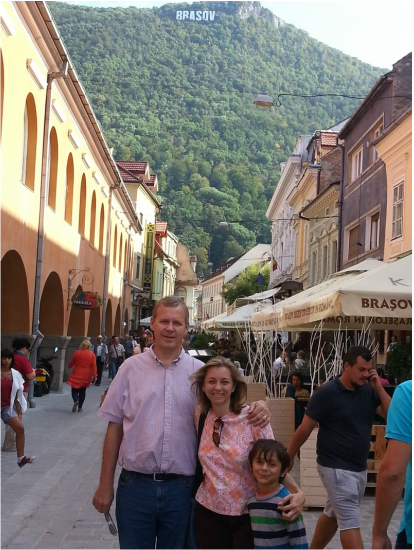 After the retreat, our host and the pastor of Petra took us a couple hours out of his way to drive us to Brashov, a beautiful town in the center of Romania with a lovely old town with beautiful buildings and parks. On the drive to Brashov, we stopped in Bran, the location of the castle of the man who inspired the Dracula myth. We didn't have a great interest to tour the castle itself, but we did enjoy a Hungarian pastry of thin bread crust cooked rotating over coals for a few minutes, and sprinkled with sugar and cinnamon, nuts or cocoa. All 8 of us (Alex, Nati his wife, his four kids and the two of us) devoured these tasty confections in no time. Brashov itself was filled with tourists and others enjoying a bright Sunday afternoon in the walking mall area of the old town. Alex and Nati told of their love for Brashov and we could easily see what attracted them to this beautiful city. On the drive home to Pitesti, we spoke about the challenges of church planting in Brashov. Alex is pretty aware of the church scene in Brashov, as he has spent a fair amount of time there. When he was on staff with IFES in Romania, he invested in the student work there, and got to know a number of the pastors in the evangelical churches. He said he has preached in most of those churches. He said that, over the time he has been visiting Brashov, perhaps 10 church plants, funded mostly from the US, have been attempted, but none has really succeeded, often because (from his perspective) they didn't think through the cultural realities in Romania but sought to model their churches too tightly on what has worked in the US. Romania is generously sprinkled with Orthodox church buildings that are largely empty on Sundays, but to which the population is oddly loyal. At Petra's church retreat, one woman in the church, Mariana, had brought her friend, also Mariana, who she told us was not a believer. At the end of the retreat, it seems that friend Mariana was moved and glad to be prayed for. Sister Mariana invited a few church leaders to pray for her, and Alex invited me to join. Several of us prayed for friend Mariana and then one man asked her to offer her own prayer to God. She felt she didn't have any idea of how to pray the way the others were. Eventually, she said, as if to excuse her lack of ability to pray in her own words, "I am Orthodox" and she settled on praying the Lord's prayer, which of course she had committed to memory. It was both encouraging and a bit discouraging at the same time. Thankfully, sister Mariana is in friend Mariana's life, and God is at work drawing her to Himself. Petra saw 10 baptisms last year--an accomplishment for a young and small church anywhere but perhaps especially here in Romania where most evangelical churches are not growing. The church has a number of young kids, but it is adult baptisms and not infants Alex is counting. Most of these baptisms are re-baptisms, because most people who come to faith through Petra's ministry were baptized as infants in the Orthodox church even if their parents really didn't have any deep faith. Alex is encouraged and has faith for big expectations for his church, and has clearly seen God work in many ways on his behalf and through him in the church. What a privilege it was to come alongside his ministry this past weekend, and to spend a week with his family. We will see him again twice more this fall, and look forward to more chances to relate to God's precious flock entrusted to his shepherd care. Sometimes I (Rich) hear Americans apologizing for the fractured American Christian church. So many denominations, so many different churches, each thinking they have the truth and (by implication or by pronouncement) their neighboring churches do not. Wouldn't it be great if there weren't 72 different Baptist denominations in North America (including Pentecostal Free Will Baptist Church and Two-Seed-in-the-Spirit Predestinarian Baptists) but just one? Do we really need 13 Presbyterian denominations? Well, I have thought a great deal about this, having traveled many times to places where there is one predominant and often governmentally-supported form of Christian faith (such as Mexico, England, France, Spain and also Serbia, Poland, Croatia and lately Russia and Belarus). In countries where there is one predominant (and dominating) religious expression you end up seeing one of two things happen: 1) the church becomes so entangled with the state that it uses political power to further its own political ends, persecuting others of different faiths and even different expressions of the same faith in Jesus; or 2) the church becomes largely irrelevant to modern life and, even if still supported by state funds, is largely dead and empty. In Western Europe things largely have gone this second direction, while in Eastern Europe largely in the former direction. Of course, there are exceptions, but in general, while unity in the church is something Paul seems to value highly in Ephesians 4, on national scales it seems to lead to church death or corruption and widespread nominalism. In fact, I cannot really think of a counter example, where a unified church expression leads to spiritual vitality. 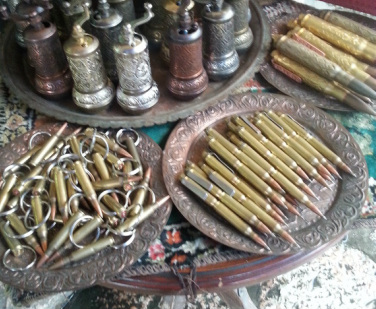 I met this morning with a pastor in Sarajevo, who described the history of the church in Bosnia. He was lamenting the equation of religious affiliation with national identity. What made religious affiliation equal to ethnic and national identity is the largely homogenous (and often historically established) ethnic churches that were quite happy to have the local monopoly on religious expression. This, in combination with the historical grievances on all sides, contributed to a nationalism and ethnic hatred that produced, most recently, the Balkan war. As our host in Bosnia kept saying, this is the place that gave our language the term "balkanization." (The picture is of a gift shop's wares in Sarajevo, where the spent bullet shells from the war have been turned into key chain fobs and pens for tourists. Who comes to Sarajevo to get a souvenir of the Balkan war?) The war has made evangelism in Bosnia especially difficult, say in comparison with other Eastern European countries. The IFES team talks with nominal Muslims all the time (it is their primary activity) who are unhappy with their life or have questions or are willing to dialogue about God. But they are not very likely to consider the claims of Jesus: after all, Jesus is the guy that the Orthodox Serbs and the Catholic Croats claim is their Lord, and they are the ones who were shelling and sniping at them during the war. (As our host said, there were really no good guys during that war, but the Serbs were the early aggressors.) So evangelism has gone very slowly, in part because of the close identification of ethnic identity and religious faith. Muslims can't convert because it isn't just a matter of individual conscience and choice, but of group identity and loyalty, and the other side is the most recent historical aggressor. I will think more about the implications of the lessons learned by evangelical Christians about ministry to Muslims after what is perceived of as a war between Christians and Muslims (that may continue to have relevance for Americans as we think of the foreign policy implications for ISIS and other threats in the Middle East). But I don't have more on that topic now. But I am left with my observation that institutional unity in the Church doesn't often produce peace and tranquility, but quite the opposite. So I am actually happy with the American Church being at odds about all sorts of things, and with hundreds of denominations and thousands of independent churches. I think it brings healthy competition to the spiritual marketplace, and it at least is one of the things that has kept the American Church, for all its many faults, dynamic while in most places in the Western world the church is in rapid retreat. (And for those who want to point out that the Church in Africa is even more fractured and more dynamic, I would only say, Yes! and Amen!) 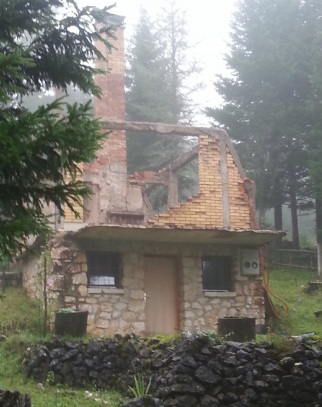 What a privilege it has been to be with the staff-workers who are serving with IFES here! Here are a few reflections (from Lisa) on our week: A Long Recovery Though the war that devastated Bosnia in the 90’s may seem a distant memory to many of us from the United States, especially as so many pressing current conflicts around the globe dominate our minds, the damage is still apparent here and the recovery, economic and otherwise, is still not complete. (If you need a little refresher on the 1425 day-long Siege of Sarajevo in particular, you can look here http://en.wikipedia.org/wiki/Siege_of_Sarajevo) It was particularly striking to walk around the downtown area, with its strikingly beautiful hills on either side, and to see how vulnerable this made Sarajevo to snipers who filled those hills. Driving into the mountains, we saw several bombed houses that have never been rebuilt. Our hosts here told us that in the years right after the war, optimism about the country’s prospects for recovery was high. Sadly, the global downturn and other forces kept that recovery from occurring as hoped. Today, unemployment nationwide is over 25%, and glum pessimism is one of the cultural forces that can weigh down all who live here. A Challenging Mission Field Student ministry looks very different here than in the United States, or even than almost anywhere else in Europe. You may know that Bosnia is a strongly Muslim nation. Though practices may differ quite a bit from Islam as it is practiced in the Middle East, loyalty to it runs deep here. In the US, campus ministries are often shaped around a lively and large weekly gathering; that is not even on the horizon for the staff workers here. Instead, they have worked hard to create English clubs, and even Spanish and German clubs which have a strong reputation for excellence at the universities. These clubs form platforms for relational ministry in the coffee shops that abound in Bosnia, where staff and the relatively few believing students seek to love students and share their faith in winsome ways. Our invitation was to join the eight staff who give their creativity, love, and energy so faithfully to this ministry, as they gathered (with their six adorable small children) for their national staff retreat. It was truly a joy to be with them for five days in a mountain cabin. It was also a challenge, as rain prevented us from leaving said cabin much, and a virus or ‘something in the water’ meant that most of the adults and children had at least a day of tummy troubles working their way out in one direction or the other… Rich and I included. I was disappointed to have to back out of a teaching session on Robert Clinton’s material on Finishing Well that I had been eager to teach, but grateful that Rich had a salient similar session in his back pocket. 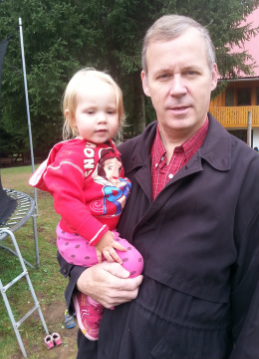 Kids! We were amazed at the ways the parents, their own bodies depleted, poured out love on their kids, who were frankly not in top form themselves. The non-parents on the team gave themselves to that endeavor servant-heartedly as well. Rich and I have been stretched to give ourselves in this area, both at the Family Camp in Latvia and here. We have always said that we were better parents once our kids turned about four, but both settings have abounded in children under four, and it has been a surprisingly delightful aspect of our journey to be called upon to be part of the team that is needed for a child to thrive (or survive) on a retreat. We also were asked to share with the Bosnian parents informally about how raising children while in ministry went for us. While our setting was not nearly as challenging, we did face being far from grandparents—the biggest challenge articulated by these parents. On that point we could only offer our empathy, but on the question of how kids do when raised in a ministry context we had several hopeful stories. We think our two have turned out quite well, though we are of course biased… 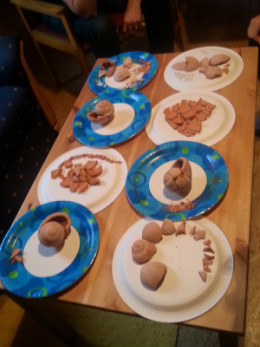 Broken Pots I have been blessed with a gifted spiritual director who is also a therapist and an artist (see http://www.lynnefarrow.com/ for some of her amazing artwork and reflections on life). I first met her at a youth ministry retreat, where she gave us the startling directive to take a perfectly good clay pot, place it in a paper bag, and smash it with a hammer. (We were mercifully given the option of breaking it ‘a little or a lot’ as seemed best to us.) We then were invited to stare at the pieces spread out on a paper plate and ‘see what emerged.’ Do you want to attempt to rebuild it, with some glue? Or does it seem more fitting to create something entirely new, a mosaic out of the brokenness? As we worked she peppered us with questions, and eventually most of us identified an area of brokenness within or without that we needed to mourn, let go of, or maybe celebrate the substantial restoration that had taken place. I was deeply moved by this exercise and, reflecting on the brokenness in Bosnia’s history, sensed that it could be meaningful for the staff team here. It was a bit of a risk, and indeed there was some resistance as we began, mostly in the form of questions: “What does the pot represent? What does the hammer represent? Are you saying God is smashing us?” I encouraged them to let that emerge, and as we shared around couches at the end, it was clear that God had used the exercise to probe hearts, letting pain surface and speaking to them about his desire to bring healing and to be with them in the toughest places of their lives. In addition to pot-smashing and parenting discussions, we enjoyed offering sessions on viewing Leadership as a Doctor’s Prescription rather than a Job Description, three soaks in Romans 8, a session on telling the stories of Scripture well, and one on navigating transitions and learning from failure. We also led the team through the Ignatian process of Examen each evening by candlelight. In and around their more practical planning sessions, we brought what we could to refresh and encourage a team that is giving their all to love Bosnians in Jesus’ name. Despite the ‘light and momentary afflictions’ of illness, we come away profoundly grateful for the opportunity to be with them. We head next to Romania, where Rich is the speaker for an all-church retreat and where we will connect in various ways with the IFES movement there. Thank you as always for your prayers for stamina as we continue the journey. |
Archives
April 2024
AuthorRich and Lisa Lamb Categories |
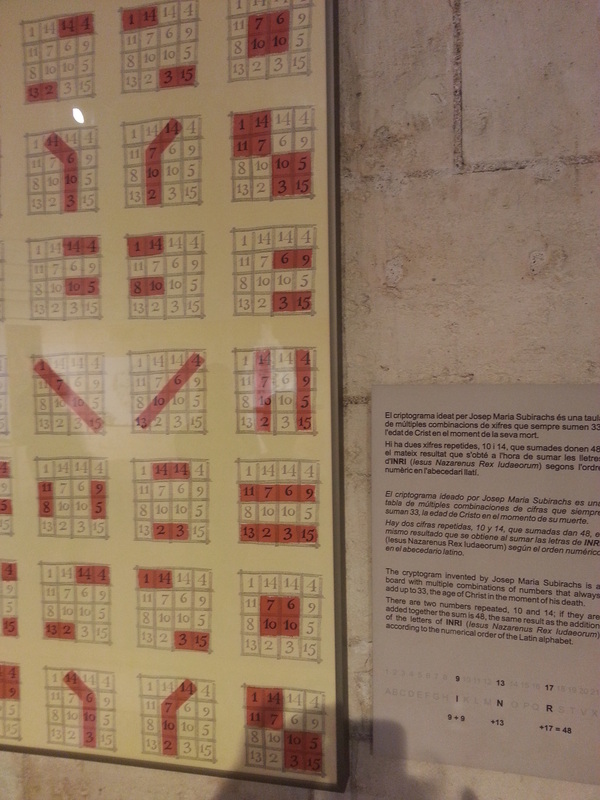
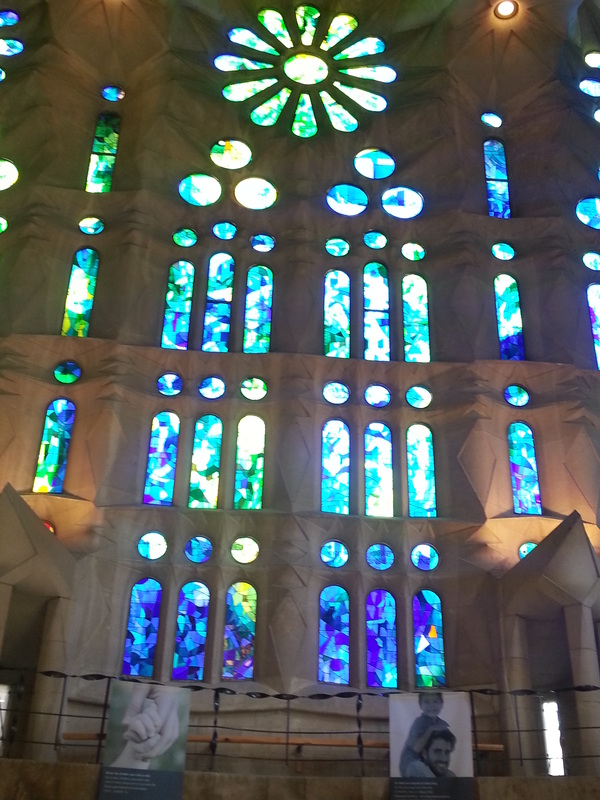
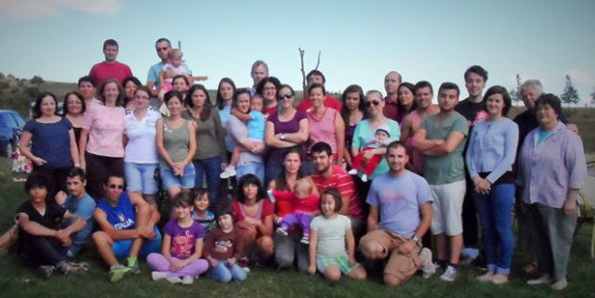
 RSS Feed
RSS Feed